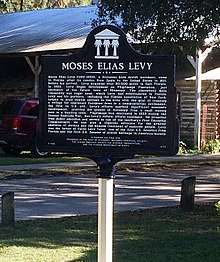Moses Elias Levy
Moses Elias Levy (1782 in Mogador, Morocco – September 7, 1854 in White Sulphur Springs, Virginia) was a Jewish-American businessman and a social and religious reformer. Born into a Sephardic Jewish family, he had become a businessman in Morocco and the British West Indies, making a fortune in lumber. He immigrated to Florida territory in the United States with his young family in the early 1820s. He was unusual as a slaveholder who also advocated for the gradual emancipation of slaves. Levy wrote "A Plan for the Abolition of Slavery" while in London in 1828, achieving celebrity at the height of the antislavery campaign.
Life
Moses Elias Levy, a Sephardi Jewish businessman, was born in Mogador, Morocco. As a young man he went to England and the British West Indies, making a fortune in lumber on St. Thomas.[1][2] He married a Sephardi woman whose ancestors had left Spain in the 15th-century expulsion, migrating to the Protestant Netherlands and England. Some later migrated to the Caribbean as English colonists during the British occupation of the Danish West Indies (now the United States Virgin Islands). Moses Levy was a first cousin and business partner of Phillip Benjamin, the father of Judah P. Benjamin, the future Secretary of State of the Confederate States of America.[3]
In the United States, Levy soon purchased 50,000 acres in north-central Florida, where he developed Pilgrimage Plantation, a refuge for persecuted European Jews. He also was among the founders of the town of Micanopy. Levy is frequently noted as the father of U.S. Senator David Levy Yulee, the first senator of Jewish ancestry.[4] Pilgrimage Plantation, the first communitarian refuge in America for displaced European Jews, was destroyed by Seminole forces in 1835 during the onset of the Second Seminole War.[5]

MOSES ELIAS LEVY - Florida Department of State marker text
Moses Elias Levy (1782-1854), a Moroccan-born Jewish merchant, came to Florida after its cession from Spain to the United States in 1821. Before his arrival, Levy acquired over 50,000 acres in East Florida. In 1822, Levy began development on Pilgrimage Plantation, just northwest of the future town of Micanopy. The plantation's main commodity was sugar cane, which Levy had reintroduced to Florida. Levy and his partners, including the Florida Association of New York, helped to draw Jewish settlers to the area with the goal of creating a refuge for oppressed European Jews in a communitarian settlement, the first on U.S. soil. Levy's efforts sparked significant economic development, spurring the growth of Micanopy from a small trading post to a bustling town. Pilgrimage was destroyed in 1835 during the Second Seminole War, but Levy's reform efforts continued. He promoted free public education and served as one of the territory's first Education Commissioners. He was also a vigorous advocate for the gradual abolition of slavery and the humane treatment of enslaved people. Levy was the father of David Levy Yulee, one of the first U.S. Senators from Florida and the first U.S. Senator of Jewish heritage in American History.
A FLORIDA HERITAGE SITE
SPONSORED BY THE TOWN OF MICANOPY, MICANOPY HISTORICAL SOCIETY, THE JEWISH AMERICAN SOCIETY FOR HISTORIC PRESERVATION, AND THE FLORIDA DEPARTMENT OF STATE 2015
References
- ↑ Kurt F. Stone, The Jews of Capitol Hill: A Compendium of Jewish Congressional Members, 2010, page 4
- ↑ Roger Moore, Ron Kurtz, Amelia Island and Fernandina Beach, 2001, p. 1873
- ↑ Mosaic: Jewish Life in Florida (Coral Gables, FL: MOSAIC, Inc., 1991): 9
- ↑ Monaco, C. S. (2005). Moses Levy of Florida: Jewish Utopian and Antebellum Reformer. Louisiana State University Press. ISBN 0-8071-3095-8.
- ↑ Huhner, Leon (April 1941). "Moses Elias Levy: An Early Florida Pioneer and the Father of Florida's First Senator". The Florida Historical Quarterly. Florida Historical Society. 19 (4): 319–345. JSTOR 30138386.